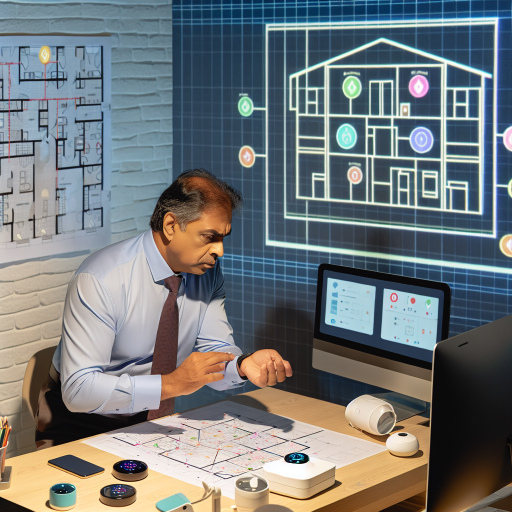Introduction to PropTech and Its Significance in Real Estate Transactions
PropTech refers to property technology innovations transforming the real estate industry.
It streamlines transactions, enhances user experiences, and increases transparency.
Additionally, PropTech empowers buyers, sellers, and agents through new tools and platforms.
These innovations leverage data and technology to provide valuable insights.
The Evolution of Real Estate Transactions
The traditional real estate process often involved cumbersome paperwork and lengthy negotiations.
Furthermore, it lacked real-time data accessibility, making informed decisions challenging.
PropTech addresses these issues through digital solutions that expedite transactions.
For instance, online listings allow buyers to access property information instantly.
This shift improves efficiency and enhances customer satisfaction.
Core Technologies Shaping PropTech
Numerous technologies contribute to the PropTech landscape.
- Artificial Intelligence (AI) enhances property valuation.
- Blockchain ensures secure and transparent transactions.
- Virtual reality (VR) offers immersive property tours.
- Big data analytics provides insights into market trends.
These technologies streamline operations, making the buying and selling process seamless.
Benefits of PropTech in Real Estate Transactions
PropTech introduces various advantages for all stakeholders involved.
- It enhances communication between buyers and sellers.
- Additionally, it reduces transaction times significantly.
- Cost savings arise from minimized inefficiencies.
- Lastly, the increased transparency builds trust among parties.
Ultimately, these benefits lead to a more dynamic and responsive real estate market.
Case Studies of Successful PropTech Implementations
Several companies successfully implement PropTech solutions in real estate transactions.
A notable example is Zillow, which revolutionized property listings through user-friendly interfaces.
Another example is Redfin, which utilizes AI for property valuations and listing recommendations.
These innovations demonstrate how technology can enhance customer experiences and market engagement.
Overview of Key Technologies Driving PropTech Innovations
Artificial Intelligence in Real Estate
Artificial intelligence is transforming real estate transactions.
This technology analyzes market trends with impressive speed.
Moreover, AI enhances customer service through chatbots and virtual assistants.
Blockchain for Transparency and Security
Blockchain technology offers unprecedented transparency in transactions.
This decentralized ledger system ensures all parties access the same information.
Additionally, it improves security by reducing the risk of fraud.
Virtual and Augmented Reality Enhancements
Virtual reality allows prospective buyers to tour properties remotely.
This immersive experience saves time and helps narrow down options.
Furthermore, augmented reality provides interactive features during viewings.
Big Data Analytics for Informed Decision-Making
Big data analytics collects vast amounts of information on buyer behaviors.
This insight enables real estate professionals to tailor their strategies.
Consequently, agents can target marketing efforts more effectively.
Internet of Things (IoT) for Smart Properties
The Internet of Things connects devices within properties seamlessly.
Smart home features enhance the living experience for residents.
Additionally, IoT sensors can monitor property conditions in real-time.
Mobile Applications for User Convenience
Mobile applications simplify the real estate search process.
Users can access listings, schedule tours, and communicate with agents easily.
As a result, both buyers and sellers benefit from improved efficiency.
Smart Contracts: Automating Transactions Through Blockchain
What Are Smart Contracts?
Smart contracts are self-executing contracts with the agreement directly written into code.
They automate and enforce the negotiation and performance of contracts.
This automation eliminates the need for intermediaries.
Moreover, they ensure trust and transparency between parties.
Benefits of Using Smart Contracts
Smart contracts enhance efficiency in real estate transactions.
They reduce processing time by automating tasks.
Subsequently, this decreases costs associated with traditional methods.
Additionally, these contracts provide enhanced security through encryption.
They minimize the risk of fraud and unauthorized alterations.
Real-World Applications
Several companies are innovating with smart contracts in real estate.
Propy, for instance, enables international real estate transactions on the blockchain.
This platform allows buyers and sellers to complete deals seamlessly.
Another example is the startup, ShelterZoom, which streamlines property offers.
They facilitate real-time negotiations using smart contract technology.
Challenges and Considerations
Despite their advantages, smart contracts face specific challenges.
For example, legal recognition varies across jurisdictions.
This can complicate enforcement in traditional legal systems.
Furthermore, creating smart contracts requires precise coding skills.
Errors in code can lead to unintended consequences.
The Future of Smart Contracts in Real Estate
The adoption of smart contracts is poised to grow significantly.
Real estate professionals must adapt to this evolving landscape.
Education about technology will be crucial for widespread acceptance.
As regulations develop, smart contracts could become standard practice.
This shift assures faster, more secure real estate transactions.
Gain More Insights: How Drones Are Enhancing Property Marketing Strategies
Virtual and Augmented Reality: Enhancing Property Viewings for Buyers
The Role of Virtual Reality in Real Estate
Virtual reality (VR) transforms how buyers view properties.
It allows for immersive experiences from anywhere in the world.
Potential buyers can explore homes without physical travel.
Agents can showcase multiple listings quickly and effectively.
This technology reduces the time spent in the buying process.
Benefits of Augmented Reality for Property Showings
Augmented reality (AR) overlays digital information onto real-world images.
It helps buyers visualize their future homes with ease.
For example, AR can display furniture arrangements in a space.
This feature allows buyers to see the property’s potential instantly.
Moreover, it enhances engagement and emotional connection with the property.
Improving Buyer Decision-Making
VR and AR offer unique tools for buyer education.
They provide detailed property tours that highlight important features.
Buyers can compare different properties side by side.
This access to information empowers informed decisions.
Consequently, buyers feel more confident about their choices.
Advancements in Technology
Continuous advancements in VR and AR enhance real estate transactions.
Leading companies are investing in better software and equipment.
High-definition graphics improve the overall viewing experience.
Furthermore, cloud technology enables seamless access to listings.
These innovations attract tech-savvy buyers to the market.
The Future of Real Estate Transactions
As technology evolves, so do buyer expectations.
VR and AR will likely become standard tools in real estate marketing.
More agents will adopt these technologies for competitive advantage.
Ultimately, this shift will simplify and enhance buyer experiences.
Alongside traditional methods, digital solutions will redefine transactions.
Discover More: How PropTech Is Changing The Way Americans Buy And Sell Homes
Data Analytics: Transforming Market Insights and Decision Making
The Role of Data Analytics in Real Estate
Data analytics plays a crucial role in real estate transactions.
It provides insights that drive informed decision-making.
Moreover, it helps identify market trends and opportunities.
Enhancing Market Insights
Real-time analytics empower agents and investors.
They can access up-to-date market data quickly.
This access enables them to make timely decisions.
Predictive Analytics: Looking Ahead
Predictive analytics forecasts future market trends.
Algorithms analyze historical data to predict outcomes.
As a result, stakeholders can mitigate risks effectively.
Improving Property Valuation
Accurate data significantly enhances property valuation.
Analytics tools evaluate numerous market factors.
These include location, property condition, and market demand.
Increasing Operational Efficiency
Data analytics streamlines real estate operations.
Automated reporting saves time and increases productivity.
This efficiency allows teams to focus on strategic initiatives.
Case Studies of Successful Implementation
Companies like Redfin leverage data analytics effectively.
They provide buyers with detailed market analyses.
Thus, clients can make smarter decisions based on reliable data.
Challenges and Considerations
Despite its benefits, data analytics poses challenges.
Data privacy and security remain significant concerns.
Additionally, the quality of data impacts the analysis outcomes.
The Future of Data Analytics in Real Estate
The future promises innovation in data analysis tools.
Artificial intelligence will enhance analytical capabilities further.
This evolution will redefine how real estate transactions occur.
Find Out More: How Smart Home Technology is Adding Value to Real Estate
Artificial Intelligence: Streamlining Property Management and Customer Service
Enhancing Operational Efficiency
Artificial intelligence revolutionizes the way property management operates.
This technology automates routine tasks, which saves time and reduces errors.
For example, AI tools can handle tenant inquiries efficiently.
Chatbots respond to questions instantly, creating a seamless experience.
Furthermore, automated scheduling systems book appointments without human input.
Improving Tenant Experience
AI significantly enhances the tenant experience in multifamily properties.
Smart home technologies make living more convenient and enjoyable.
For instance, residents can control lighting and heating using voice commands.
Additionally, predictive maintenance alerts managers to issues before they escalate.
This proactive approach reduces downtime and increases tenant satisfaction.
Data-Driven Insights
Data analytics powered by AI provides valuable insights for property managers.
These insights help identify trends and optimize lease pricing strategies.
With real-time data, managers can adapt to market conditions swiftly.
Moreover, AI tools analyze tenant behavior to enhance marketing strategies.
This enables targeted promotions that resonate with potential renters.
Streamlining Communication
AI simplifies communication between property managers and tenants.
Automated messaging systems keep tenants informed about updates and events.
These systems ensure that vital information reaches residents promptly.
Additionally, AI can analyze tenant feedback to improve services.
This ongoing dialogue fosters a community feel in rental spaces.
Sustainable Practices
Artificial intelligence encourages sustainable practices in property management.
Energy management systems optimize consumption based on real-time data.
This approach not only lowers operating costs but also reduces environmental impact.
Furthermore, AI assists in implementing effective waste management strategies.
These sustainable practices attract eco-conscious tenants.
Delve into the Subject: Enhancing Real Estate Value With Advanced Voice-Controlled Smart Home Systems

Online Marketplaces: Revolutionizing Property Listings and Transactions
Introduction to Online Marketplaces
Online marketplaces have significantly changed the real estate landscape.
They provide a centralized platform for buyers and sellers.
These platforms offer ease and convenience in property transactions.
Advantages of Online Marketplaces
Firstly, online marketplaces increase visibility for listings.
Homeowners can showcase their properties to a broader audience.
Additionally, potential buyers have access to an extensive property range.
This boosts competition and drives fair pricing.
Streamlined Transactions
Furthermore, online marketplaces simplify the buying process.
Users can find properties, compare prices, and make offers seamlessly.
Many platforms offer integrated communication tools for negotiations.
This reduces the time and effort spent on traditional methods.
Innovative Features Enhancing User Experience
Moreover, many online marketplaces incorporate advanced technologies.
Virtual tours allow buyers to explore homes remotely.
3D floor plans provide deeper insights into property layouts.
These features improve customer engagement and satisfaction.
Case Studies of Successful Online Marketplaces
RealEstatePro has transformed how properties are listed in New York.
Its user-friendly interface attracts thousands of visitors daily.
Similarly, HomeFinder has successfully expanded into international markets.
This expansion demonstrates the global demand for online real estate services.
Future Trends in Online Marketplaces
The future holds endless possibilities for online real estate platforms.
Artificial intelligence will soon personalize user experiences even further.
Blockchain technology may enhance transaction transparency and security.
As a result, trust in online marketplaces will likely grow.
Mobile Applications
Enhancing Accessibility
Mobile applications have revolutionized how people access real estate information.
With just a few taps, users can view listings from anywhere.
This convenience facilitates quicker decision-making in property transactions.
Moreover, mobile apps provide updated information on market trends.
Streamlining Property Search
Many apps utilize advanced filtering options to assist users.
Potential buyers can search by location, price, and property type.
This targeted approach simplifies the home-hunting process.
Additionally, virtual tours allow users to explore properties remotely.
Facilitating Communication
Mobile platforms enable direct communication between buyers and agents.
Instant messaging features foster quicker responses to inquiries.
This enhances the overall customer experience significantly.
Furthermore, push notifications keep users informed about new listings.
Integrating Financial Tools
Many real estate apps now incorporate mortgage calculators.
These tools help users understand their financing options better.
Moreover, budgeting features assist buyers in evaluating their affordability.
This comprehensive approach empowers informed decision-making.
Impacts of Technology on Real Estate Transactions
Mobile applications are transforming real estate transactions.
They improve accessibility and streamline the buying process.
Ultimately, they provide a modern solution to traditional challenges.
The Role of PropTech in Promoting Sustainability and Eco-Friendly Practices
Enhancing Energy Efficiency
PropTech solutions enable real estate developers to design energy-efficient buildings.
Smart technologies monitor energy consumption in real-time.
This data helps optimize energy use and reduce costs.
Building Management Systems automate energy-saving processes.
Consequently, these systems lower carbon footprints significantly.
Facilitating Sustainable Building Materials
PropTech encourages the use of eco-friendly materials in construction.
Innovative platforms connect builders with sustainable suppliers.
This collaboration promotes the use of recycled and renewable resources.
Moreover, it enhances the overall sustainability of projects.
Improving Property Management
Technologies simplify property management, making it more efficient.
Digital platforms enable landlords to monitor waste management practices.
This capability fosters better recycling habits among tenants.
Furthermore, management apps promote sustainable living practices.
Increasing Transparency in Real Estate Transactions
PropTech enhances transparency by digitizing transaction records.
Blockchain technology ensures secure and tamper-proof documentation.
As a result, buyers and sellers gain confidence in their transactions.
This transparency helps ensure sustainable practices among stakeholders.
Encouraging Community Engagement
PropTech platforms facilitate community involvement in real estate projects.
Online forums allow residents to discuss sustainability initiatives.
These discussions increase awareness and participation in eco-friendly practices.
Consequently, communities become more engaged in local sustainability efforts.
Additional Resources
Introduction to Proptech: Redefining Real Estate Dynamics – MIPIM …
Real Estate Innovation Redefined: Embracing the Web3 Revolution




